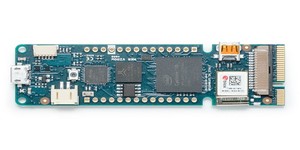
Arduino, the open-source rapid electronic prototyping project, announced a pair of new products at the Maker Faire San Mateo this weekend - including its answer to the popular Raspberry Pi single-board computer.
Designed to make microcontrollers - tiny computers capable of real-time input-output operations often used to drive robots or read sensor data - accessible to non-programmers, Arduino was founded in 2005 by Massimo Banzi and David Cuartielles. Originally designed to help teach electronics and programming to students, the project has turned into an open-hardware success story with hundreds of thousands of official Arduino projects having shipped to date - joined by many more unofficial compatible devices, based on the schematics and source code released by the Arduino team as part of its commitment to open development.
As successful as the Arduino project has been, there is a greater success story that has crowded it out of the headlines: the Raspberry Pi. Having sold over a million units in its first year, the Pi has dwarfed the Arduino. Despite being aimed at very different markets - the Arduino is a powerful microcontroller with excellent general-purpose input-output (GPIO) capabilities, while the Pi is a more flexible microcomputer that lacks the GPIO chops of the Arduino - the two projects are frequently compared, and the additional computational power provided by the Pi finds the Arduino wanting.
Thus we find the first of Arduino's two major product announcements: the Arduino Yún. Based loosely on the existing Arduino Leonardo, the Yún is designed to bridge the gap between the capabilities of the Leonardo and the Raspberry Pi. Rather than being a pure microcontroller, like previous Arduino designs, the Yún packs an ATmega 32U4 microcontroller alongside an Atheros AR9331 MIPS-based system-on-chip microcomputer. The result: an Arduino that arrives running a variant of OpenWRT Linux.
That extra chip gives the Yún significant extra power: in addition to doing everything an Arduino Leonardo can do, the Yún includes integrated Wi-Fi connectivity - something that previous Arduinos have lacked, requiring expensive add-on boards known as 'shields' to obtain - for both programming and direct control. When powered up, the Yún - Chinese for 'cloud' - turns into a Wi-Fi access point. This provides access to a configuration screen for connecting the Yún to your own wireless network, and once connected the true power of the Yún is unveiled: code written on the Atmel microcontroller can communicate across the network in both directions, while the underlying Linux base can serve webpages for sensor readings or control of connected devices.
The computational power of the Yún is certainly nothing near that of the Pi or its rival ARM-based single-board computers: OpenWRT was originally designed as a replacement OS for selected broadband routers and gateways, and the AR9331 chip can't match the Pi's Broadcom BCM2835 for performance. For hardware hackers, however, the benefits of low-level access to a microcontroller combined with the flexibility of a Wi-Fi connected Linux microcomputer should prove a powerful draw when the device launches next month for $69 (around £45 excluding taxes.)
The second Arduino announcement at the Maker Faire was the Arduino Robot Kit, which provides a platform for Arduino-compatible robotics experimentation. Based around two boards, the Motor Board and Control Board, both of which contain their own ATmega 32U4 microcontroller, the system includes two motors connected to wheels, a speaker, on-board liquid-crystal display panel, an analogue potentiometer, five-button control pad, infra-red sensors, an SD card reader and a digital compass - plus prototyping areas for adding your own components to the mix.
All that functionality does come at a cost, however: pricing for the kit at the Maker Faire itself was set at $275 (around £181 excluding taxes) - although that price does include everything needed to get started, with no requirement to have a separate Arduino board.
Both devices are expected to reach the UK in the coming weeks.
Designed to make microcontrollers - tiny computers capable of real-time input-output operations often used to drive robots or read sensor data - accessible to non-programmers, Arduino was founded in 2005 by Massimo Banzi and David Cuartielles. Originally designed to help teach electronics and programming to students, the project has turned into an open-hardware success story with hundreds of thousands of official Arduino projects having shipped to date - joined by many more unofficial compatible devices, based on the schematics and source code released by the Arduino team as part of its commitment to open development.
As successful as the Arduino project has been, there is a greater success story that has crowded it out of the headlines: the Raspberry Pi. Having sold over a million units in its first year, the Pi has dwarfed the Arduino. Despite being aimed at very different markets - the Arduino is a powerful microcontroller with excellent general-purpose input-output (GPIO) capabilities, while the Pi is a more flexible microcomputer that lacks the GPIO chops of the Arduino - the two projects are frequently compared, and the additional computational power provided by the Pi finds the Arduino wanting.
Thus we find the first of Arduino's two major product announcements: the Arduino Yún. Based loosely on the existing Arduino Leonardo, the Yún is designed to bridge the gap between the capabilities of the Leonardo and the Raspberry Pi. Rather than being a pure microcontroller, like previous Arduino designs, the Yún packs an ATmega 32U4 microcontroller alongside an Atheros AR9331 MIPS-based system-on-chip microcomputer. The result: an Arduino that arrives running a variant of OpenWRT Linux.
That extra chip gives the Yún significant extra power: in addition to doing everything an Arduino Leonardo can do, the Yún includes integrated Wi-Fi connectivity - something that previous Arduinos have lacked, requiring expensive add-on boards known as 'shields' to obtain - for both programming and direct control. When powered up, the Yún - Chinese for 'cloud' - turns into a Wi-Fi access point. This provides access to a configuration screen for connecting the Yún to your own wireless network, and once connected the true power of the Yún is unveiled: code written on the Atmel microcontroller can communicate across the network in both directions, while the underlying Linux base can serve webpages for sensor readings or control of connected devices.
The computational power of the Yún is certainly nothing near that of the Pi or its rival ARM-based single-board computers: OpenWRT was originally designed as a replacement OS for selected broadband routers and gateways, and the AR9331 chip can't match the Pi's Broadcom BCM2835 for performance. For hardware hackers, however, the benefits of low-level access to a microcontroller combined with the flexibility of a Wi-Fi connected Linux microcomputer should prove a powerful draw when the device launches next month for $69 (around £45 excluding taxes.)
The second Arduino announcement at the Maker Faire was the Arduino Robot Kit, which provides a platform for Arduino-compatible robotics experimentation. Based around two boards, the Motor Board and Control Board, both of which contain their own ATmega 32U4 microcontroller, the system includes two motors connected to wheels, a speaker, on-board liquid-crystal display panel, an analogue potentiometer, five-button control pad, infra-red sensors, an SD card reader and a digital compass - plus prototyping areas for adding your own components to the mix.
All that functionality does come at a cost, however: pricing for the kit at the Maker Faire itself was set at $275 (around £181 excluding taxes) - although that price does include everything needed to get started, with no requirement to have a separate Arduino board.
Both devices are expected to reach the UK in the coming weeks.

MSI MPG Velox 100R Chassis Review
October 14 2021 | 15:04








Want to comment? Please log in.